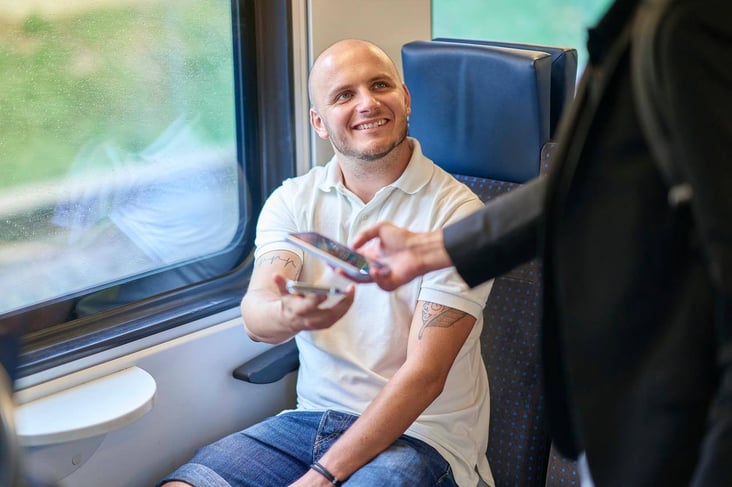-1639420876.png?width=732&name=blog-teaser-bild-(1)-1639420876.png)
Industry interview with the Fraunhofer Institute
-1639420876.png)
The Fraunhofer Institute for Transportation and Infrastructure Systems (Fraunhofer IVI) is part of the Dresden-based Fraunhofer-Gesellschaft zur Förderung der angewandten Forschung e.V., Europe's largest application-oriented research organisation.
Torsten Gründel, Head of Intelligent Transportation Systems at Fraunhofer IVI, kindly agreed to answer some of our questions on product and control modules (PCM). FAIRTIQ and Fraunhofer IVI are currently involved in two projects in Germany that use PCM: the pilot scheme in Baden-Württemberg and the FAIRTIQ rollout in NRW, scheduled for the end of 2021.
FAIRTIQ: In one sentence, what are PCM?
Torsten Gründel:
PCM-based fare modules are files that contain a complete set of fare data for a specific use case. That's to say, they contain huge volumes of linked data, rules and algorithms. An industry standard regulates the format they take and ensures their standardised processing by public transport sales and control systems.
FAIRTIQ: What are the benefits of PCM for public transport operators and associations? How do they change processes and could they even facilitate the introduction of new flexible fare products?
Torsten Gründel:
PCM-based fare models work according to the 'modular design principle'. The appropriate fare features are selected and linked using configurable algorithms to create a complete function. The fact that the processing of fare modules is the same across all devices, the resulting fare mapping product can be implemented in multiple devices and systems without having to repeatedly implement the fare every time. Although a few tweaks are needed in most cases, this approach makes it very easy to implement new fare products, especially flexible fares. Because data processing is standardised, no changes need to be made to the supporting device or system software.
FAIRTIQ: Fraunhofer IVI, FAIRTIQ and other partners are behind the successful pilot project in Baden-Württemberg which uses in/out technology to facilitate seamless cross-network travel. What are the challenges in terms of PCM and have you gained new insights from the implementation process?
Torsten Gründel:
PCM is a perfect fit for in/out technology. All fares that have to be entered into the system can be processed in a technically uniform way. In the Baden-Württemberg case, fare modules include the state-wide 'bwtarif', the fare schedules of each of the public transport associations, as well as local transition pricing and best price arrangements. What's important here is that the underlying data are standardised. For example, the process for tagging stops, routes and means of transport should be harmonised as far as possible so as to avoid the time-consuming work of mapping the data. This is almost always a challenge, although major advances have been made in this regard, both in Baden-Württemberg and across the entire sector.
FAIRTIQ: Say that a transport association wants to implement its fare as a PCM. How long will it take for the PCM to become operational? Does it take longer to implement eFares than conventional zone-based fare schedules, or vice versa, for example?
Torsten Gründel:
It always depends on what the starting conditions are. Are fare data already available, in local databases for example? To what extent can the head of fare management help solve technical problems? These types of processes tend to take longer than the implementation process itself; it normally takes only a few person-weeks to complete. Also, you have to factor in the time it takes to work through a raft of technical design plans for the application itself, which has to be done before PCM implementation can begin.
FAIRTIQ: It seems that PCM is gradually becoming the industry standard in Germany when it comes to the mapping and management of fares. What is your take on these developments? Do you think that the standard could be applied in other countries, too?
Torsten Gründel:
In my opinion, this is a very welcome development as it shows that digitalisation – through the implementation of PCM-based fare modules – can make it massively easier to implement often complex fare schedules. This is good news for fare management personnel, as well as device and system manufacturers. As the project in Baden -Württemberg bears out, public transport users also benefit, thanks to a standardised system that is capable of identifying the appropriate fare and product for cross-network journeys. At Fraunhofer IVI, we were conscious of the fact that system providers like FAIRTIQ operate in multiple countries, which is why we developed the PCM in such a way that their technical implementation would also be possible outside of Germany, too.
FAIRTIQ: In which areas do you see further development in terms of fares and PCM? At the moment, there is a great deal of talk and movement on eFares and flexible fare products.
Torsten Gründel:
You're right. Digitalisation brings a whole new set of challenges for the public transport industry. Public transport operators and associations need to adapt in terms of personnel, organisational structure and expertise. I think we need to start providing transport companies and associations with the best possible support across the entire range of PCM applications, whether it is fare determination in in/out systems, implementation across a multitude of sales channels or electronic controls. This will make it much easier to offer users new fare products, such as cross-network fares.
Thank you very much, Mr. Gründel, for the informative interview!




.jpg?width=732&name=220907hallandstrafiken-buss7103%20(2).jpg)



Share